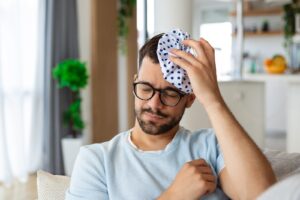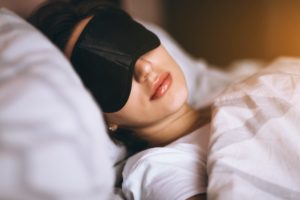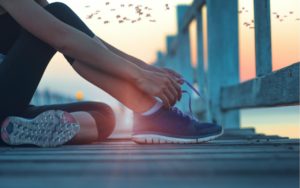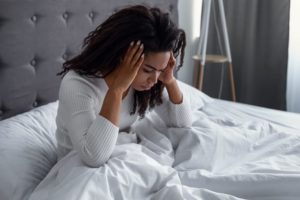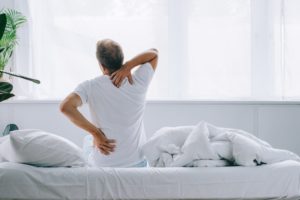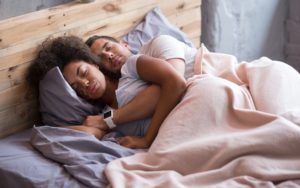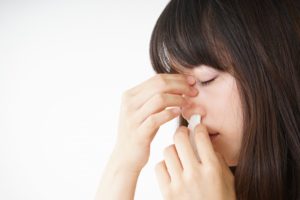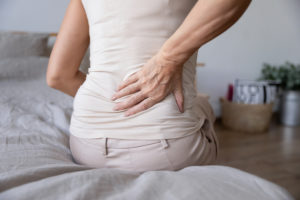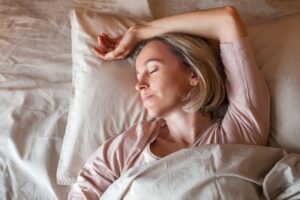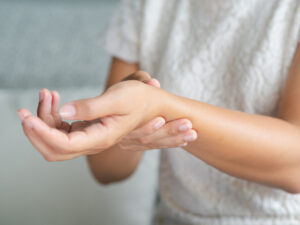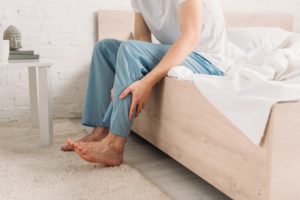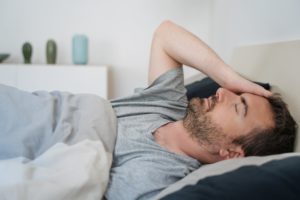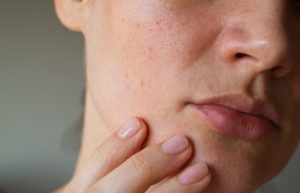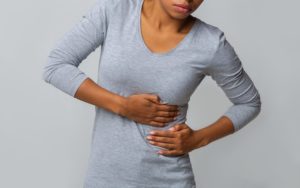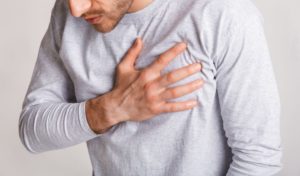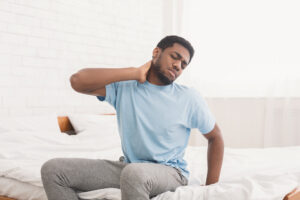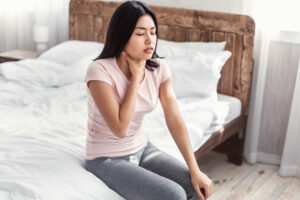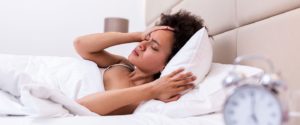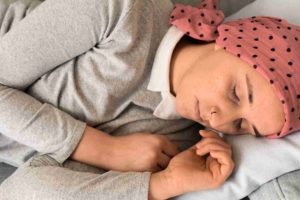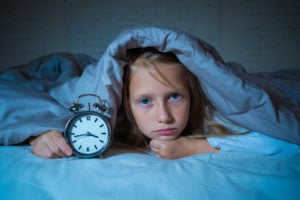The Connection Between Diet, Exercise, and Sleep
Diet, exercise, and sleep are three pillars of a healthy life. Improving just one of these lifestyle factors can help people lead longer lives.
While diet, exercise, and sleep influence one another in complex and innumerable ways, improving all three may be more beneficial for both physical and mental health. Learn about how these activities affect one another and why research has shown that the more your improve these behaviors, the better your well-being.
Are You Getting Enough Deep Sleep?
A variety of issues can cause degrade your sleep quality. Answer three questions to understand if it’s a concern you should worry about.
The Importance of Diet and Nutrition
Diet and nutrition affect virtually all aspects of a person’s health. Eating a healthy, balanced diet has been shown to reduce the risk of a myriad of health conditions , including heart disease, stroke, diabetes, and obesity. Diet can also affect mental health , with several studies suggesting that certain diets may reduce the risk of developing depression and anxiety.
Food can either help or hinder a workout, and research shows that combining a healthy diet with adequate exercise offers more benefits than improving diet alone . The right combination of fluids, carbohydrates, and protein eaten at the right time can improve athletic performance and decrease fatigue. Poor dietary choices, like eating right before a high-intensity cardio workout, can lead to increased nausea and make exercise more challenging.
What a person eats also impacts sleep quality and duration. Caffeine is notorious for making it more difficult to fall asleep and eating too close to bedtime can lead to sleep disruptions. Most health experts recommend avoiding caffeine prior to sleeping. Having a diet that is too high in calories or fat may make it harder to get enough sleep, as do diets lacking key nutrients , like calcium, magnesium, and vitamins A, C, D, and E.
The Benefits of Exercise and Physical Activity
Exercise is a cornerstone of health and benefits nearly every system in the body. Many of the benefits of exercise can be seen immediately, like reduced anxiety, lowered blood pressure, and better sleep. Consistent exercise offers even more long-term benefits, including better weight management, stronger bones, and a reduced risk of disease .
A substantial amount of research has shown that getting regular exercise can improve sleep . Both aerobic exercise like cardio and running, as well as resistance exercise like weightlifting, can improve sleep quality. Any amount of movement may improve sleep, although younger people usually require more exercise than older people to see the same benefits. Timing also matters when it comes to exercising for better sleep. Exercising in the morning or afternoon can help with sleep, but exercising too close to bedtime can make it difficult to fall asleep.
Working out can also reduce the risk of sleep problems, like insomnia, obstructive sleep apnea (OSA), and restless legs syndrome (RLS). Multiple studies have shown that exercise can reduce pre-sleep anxiety and improve sleep quality in people with insomnia . One study found that a 12-week regimen of aerobic and resistance training led to a reduction in the severity of OSA , while also improving sleep quality and reducing daytime fatigue. A similar study in people diagnosed with RLS found that a 12-week exercise regimen reduced the severity of this condition .

The Complex, Restorative Effects of Sleep
Sleep offers the body and brain time to restore and recover, affecting nearly every tissue in the body. Most adults need at least seven hours of sleep, yet almost one-third of Americans are getting less than that. Sleep deprivation increases the risk of health conditions like diabetes, heart disease, and stroke. Prolonged sleep deprivation can also affect concentration and other cognitive functions.
Without enough sleep, people tend to overeat and choose unhealthy foods. Sleep deprivation affects the body’s release of ghrelin and leptin, two neurotransmitters that tell the brain when to consume calories. People who are sleep deprived are more drawn toward high-calorie foods. Chronic sleep loss has been linked to having a larger waist circumference , and an increased risk of obesity .
Sleep allows muscle tissue time to recover between workouts. Sufficient sleep is also important in having the energy to exercise. Not getting enough sleep can lead to being less physically active during the day and reduced muscle strength during workouts. Sleep deprivation can also affect the safety of exercise, with increased sports injuries reported in those who are sleep deprived.
Which Is Most Important: Diet, Exercise, or Sleep?
While trying to manage a busy, hectic life, it is understandable to want to prioritize activities that provide the most benefit. Unfortunately, diet, exercise, and sleep are so deeply intertwined, it is not possible to say that one is more important than the others.
For people who are tight on time or are not able to properly address all three, it can be helpful to talk to a doctor for personalized recommendations. A doctor, with knowledge about someone’s unique health history, can help to prioritize lifestyle changes. Doctors can also refer their patients to specialists, like nutritionists, dieticians, physical therapists, and sleep specialists for more tailored advice.
Improving Sleep Through Diet and Exercise
While most people know that diet and exercise are two important ways to improve their health, sleep is often overlooked. Sleep hygiene, which involves habits that promote quality sleep, can be a starting point for improving your sleep.
- Do not eat too late: Be sure to give your body time to digest after eating large meals. Try having dinner earlier in the evening.
- Avoid caffeine: Beware of stimulants like coffee, energy drinks, and soda. If you do consume these, try to limit them to early in the day.
- Move your body: Schedule regular exercise to improve your sleep. While any movement during the daytime is beneficial, aim to get regular, moderate exercise a few days a week. Try to avoid working out too close to bedtime, giving your body a couple hours after working out to wind down before bed.
- Get natural light: Try exercising outdoors, as exposure to natural light during the day can help keep your body in sync with its natural sleep rhythms.

Still have questions? Ask our community!
Join our Sleep Care Community — a trusted hub of sleep health professionals, product specialists, and people just like you. Whether you need expert sleep advice for your insomnia or you’re searching for the perfect mattress, we’ve got you covered. Get personalized guidance from the experts who know sleep best.
References
13 Sources
-
Colditz, G.A. (2022, September 15). Healthy diets in adults. In D. Seres (Ed.). UpToDate.
https://www.uptodate.com/contents/healthy-diet-in-adults -
Bremner, J. D., Moazzami, K., Wittbrodt, M. T., Nye, J. A., Lima, B. B., Gillespie, C. F., Rapaport, M. H., Pearce, B. D., Shah, A. J., & Vaccarino, V. (2020). Diet, Stress and Mental Health. Nutrients, 12(8), 2428.
https://pubmed.ncbi.nlm.nih.gov/32823562/ -
Clark J. E. (2015). Diet, exercise or diet with exercise: comparing the effectiveness of treatment options for weight-loss and changes in fitness for adults (18-65 years old) who are overfat, or obese; systematic review and meta-analysis. Journal of diabetes and metabolic disorders, 14, 31.
https://pubmed.ncbi.nlm.nih.gov/25973403/ -
Ikonte, C. J., Mun, J. G., Reider, C. A., Grant, R. W., & Mitmesser, S. H. (2019). Micronutrient Inadequacy in Short Sleep: Analysis of the NHANES 2005-2016. Nutrients, 11(10), 2335.
https://pubmed.ncbi.nlm.nih.gov/31581561/ -
Booth, F. W., Roberts, C. K., & Laye, M. J. (2012). Lack of exercise is a major cause of chronic diseases. Comprehensive Physiology, 2(2), 1143–1211.
https://pubmed.ncbi.nlm.nih.gov/23798298/ -
Dolezal, B., Neufeld, E., Boland, D., Martin, J., & Cooper, C. (2017). Interrelationship between Sleep and Exercise: A Systematic Review. Advances in Preventive Medicine.
https://pubmed.ncbi.nlm.nih.gov/28458924/ -
Passos, G. S., Poyares, D., Santana, M. G., Garbuio, S. A., Tufik, S., & Mello, M. T. (2010). Effect of acute physical exercise on patients with chronic primary insomnia. Journal of Clinical Sleep Medicine, 6(3), 270–275.
https://pubmed.ncbi.nlm.nih.gov/20572421/ -
Kline, C. (2014). The bidirectional relationship between exercise and sleep: Implications for exercise adherence and sleep improvement. American Journal of Lifestyle Medicine, 8(6), 375–379.
https://pubmed.ncbi.nlm.nih.gov/25729341/ -
Aukerman, M. M., Aukerman, D., Bayard, M., Tudiver, F., Thorp, L., & Bailey, B. (2006). Exercise and restless legs syndrome: A randomized controlled trial. Journal of the American Board of Family Medicine, 19(5), 487–493.
https://pubmed.ncbi.nlm.nih.gov/16951298/ -
Consensus Conference Panel, Watson, N. F., Badr, M. S., Belenky, G., Bliwise, D. L., Buxton, O. M., Buysse, D., Dinges, D. F., Gangwisch, J., Grandner, M. A., Kushida, C., Malhotra, R. K., Martin, J. L., Patel, S. R., Quan, S. F., Tasali, E., Non-Participating Observers, Twery, M., Croft, J. B., Maher, E., … Heald, J. L. (2015). Recommended amount of sleep for a healthy adult: A joint consensus statement of the American Academy of Sleep Medicine and Sleep Research Society. Journal of Clinical Sleep Medicine, 11(6), 591–592.
https://pubmed.ncbi.nlm.nih.gov/25979105/ -
Liu, Y., Wheaton, A. G., Chapman, D. P., Cunningham, T. J., Lu, H., & Croft, J. B. (2016). Prevalence of healthy sleep duration among adults–United States, 2014. MMWR. Morbidity and mortality weekly report, 65(6), 137–141.
https://pubmed.ncbi.nlm.nih.gov/26890214/ -
Sperry, S. D., Scully, I. D., Gramzow, R. H., & Jorgensen, R. S. (2015). Sleep Duration and Waist Circumference in Adults: A Meta-Analysis. Sleep, 38(8), 1269–1276.
https://pubmed.ncbi.nlm.nih.gov/25581918/ -
Wu, Y., Zhai, L., & Zhang, D. (2014). Sleep duration and obesity among adults: a meta-analysis of prospective studies. Sleep medicine, 15(12), 1456–1462.
https://pubmed.ncbi.nlm.nih.gov/25450058/


